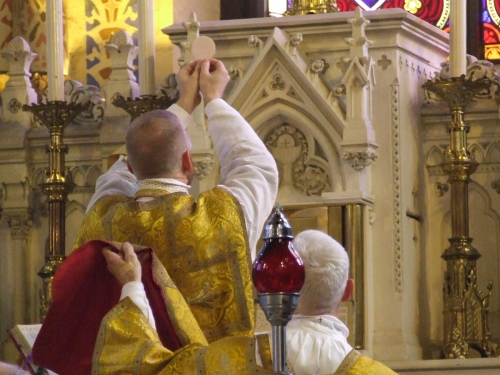 My pupose in this post is to underscore John Henry Cardinal Newman's contribution as an historian to today's debate between the defenders of the traditional Latin Mass, on the one hand, and the opponents of the immemorial right of all Catholics to access the traditional Latin Mass, on the other hand. The problem of Catholic access to the traditional Latin Mass, we know, is historically and contemporarily bound up with what Joseph Cardinal Ratzinger (in 1999) called "the crisis deriving from some of the tendencies hidden in [the New Mass promulgated by Pope Paul VI]." One such tendency, Cardinal Ratzinger expressly states, is desacralization. ~ Is a desacralized liturgy then to monopolize Catholic worship? Here -- on this neuralgic point -- is where Cardinal Newman makes his contribution as an historian. Newman points out that NEVER in her history has the Church abolished or prohibited "orthodox liturgical reforms." In citing Newman on this point approvingly, Ratzinger also acknowledges the evident fact that when a liturgy vanishes from history, that liturgy "belongs to historical times, not the present." By forceful contrast, however, the traditional Latin Mass belongs to the PRESENT. Whence Cardinal Ratzinger's citation of Cardinal Newman's affirmation of the perduring reality of orthodox liturgies. Cardinal Ratzinger writes: "The citation from Cardinal Newman means that the authority of the Church has never in its history abolished with a legal mandate an orthodox liturgy." Contrary then to some sections of opinion in the Church, the traditional Latin Mass was never abolished by Pope Paul VI. On this crucial point, Cardinal Ratzinger is happy indeed to endorse Cardinal Newman's judgment affirming the perduring presence of the Church's classical Roman liturgy. See Letter from Joseph Cardinal Ratzinger to Fr. Matias Auge, Febraury 18, 1999, at _Rorate Caeli_, September 29, 2010, Internet.
My pupose in this post is to underscore John Henry Cardinal Newman's contribution as an historian to today's debate between the defenders of the traditional Latin Mass, on the one hand, and the opponents of the immemorial right of all Catholics to access the traditional Latin Mass, on the other hand. The problem of Catholic access to the traditional Latin Mass, we know, is historically and contemporarily bound up with what Joseph Cardinal Ratzinger (in 1999) called "the crisis deriving from some of the tendencies hidden in [the New Mass promulgated by Pope Paul VI]." One such tendency, Cardinal Ratzinger expressly states, is desacralization. ~ Is a desacralized liturgy then to monopolize Catholic worship? Here -- on this neuralgic point -- is where Cardinal Newman makes his contribution as an historian. Newman points out that NEVER in her history has the Church abolished or prohibited "orthodox liturgical reforms." In citing Newman on this point approvingly, Ratzinger also acknowledges the evident fact that when a liturgy vanishes from history, that liturgy "belongs to historical times, not the present." By forceful contrast, however, the traditional Latin Mass belongs to the PRESENT. Whence Cardinal Ratzinger's citation of Cardinal Newman's affirmation of the perduring reality of orthodox liturgies. Cardinal Ratzinger writes: "The citation from Cardinal Newman means that the authority of the Church has never in its history abolished with a legal mandate an orthodox liturgy." Contrary then to some sections of opinion in the Church, the traditional Latin Mass was never abolished by Pope Paul VI. On this crucial point, Cardinal Ratzinger is happy indeed to endorse Cardinal Newman's judgment affirming the perduring presence of the Church's classical Roman liturgy. See Letter from Joseph Cardinal Ratzinger to Fr. Matias Auge, Febraury 18, 1999, at _Rorate Caeli_, September 29, 2010, Internet.DE:http://www.calcatholic.com/news/newsArticle.aspx?id=e27ff0b9-62df-4e4e-b8bd-576d8eda8a57

 inundado por um mistério de luz que é Deus e N´Ele vi e ouvi -A ponta da lança como chama que se desprende, toca o eixo da terra, – Ela estremece: montanhas, cidades, vilas e aldeias com os seus moradores são sepultados. - O mar, os rios e as nuvens saem dos seus limites, transbordam, inundam e arrastam consigo num redemoinho, moradias e gente em número que não se pode contar , é a purificação do mundo pelo pecado em que se mergulha. - O ódio, a ambição provocam a guerra destruidora! - Depois senti no palpitar acelerado do coração e no meu espírito o eco duma voz suave que dizia: – No tempo, uma só Fé, um só Batismo, uma só Igreja, Santa, Católica, Apostólica: - Na eternidade, o Céu!
inundado por um mistério de luz que é Deus e N´Ele vi e ouvi -A ponta da lança como chama que se desprende, toca o eixo da terra, – Ela estremece: montanhas, cidades, vilas e aldeias com os seus moradores são sepultados. - O mar, os rios e as nuvens saem dos seus limites, transbordam, inundam e arrastam consigo num redemoinho, moradias e gente em número que não se pode contar , é a purificação do mundo pelo pecado em que se mergulha. - O ódio, a ambição provocam a guerra destruidora! - Depois senti no palpitar acelerado do coração e no meu espírito o eco duma voz suave que dizia: – No tempo, uma só Fé, um só Batismo, uma só Igreja, Santa, Católica, Apostólica: - Na eternidade, o Céu!